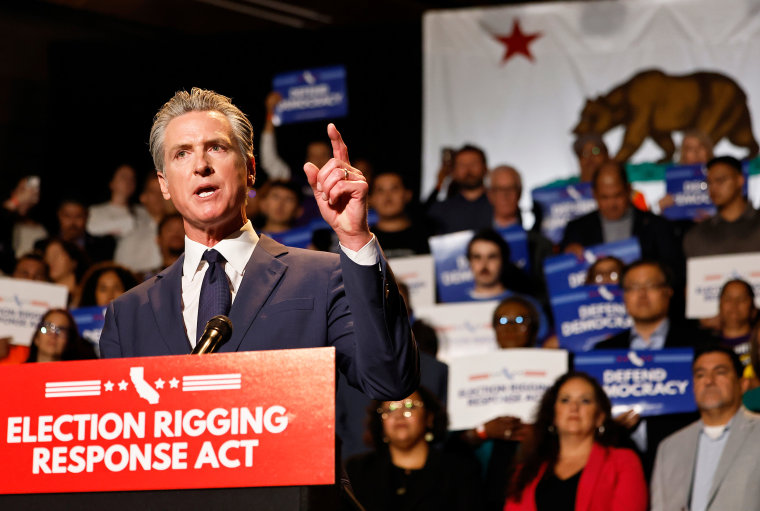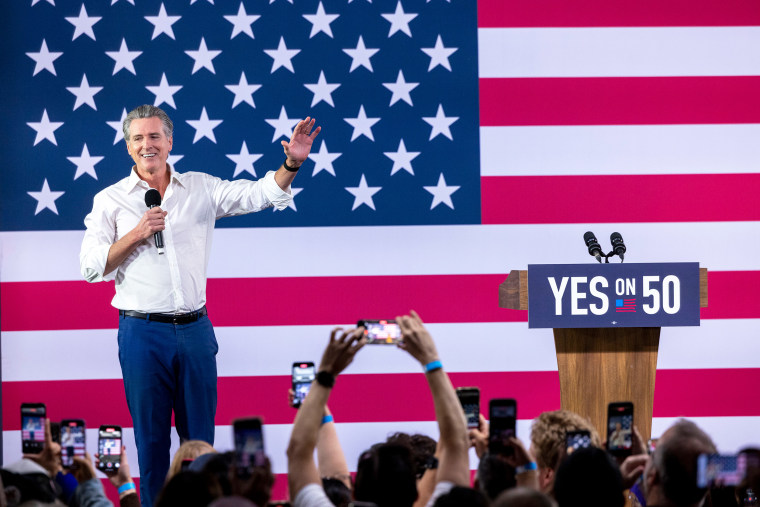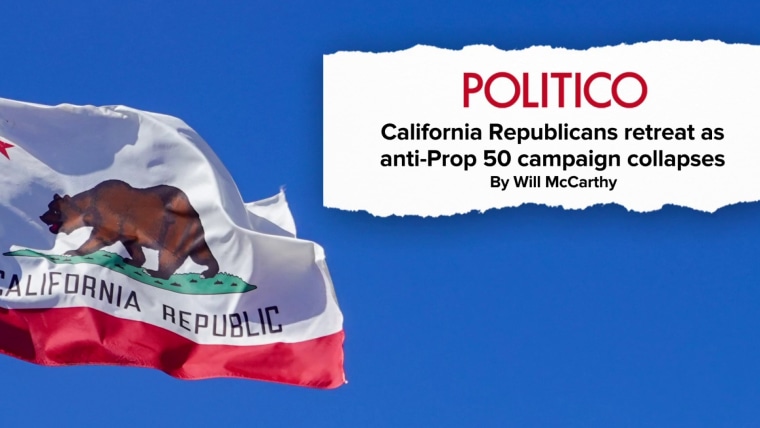While many will focus on Mamdani-mania in New York City and the outcome of high-profile governors races in New Jersey and Virginia, the political event from Tuesday most likely to affect the 2028 presidential election happened on the other side of the country. Passage of California’s Proposition 50, the redistricting issue on the state ballot, is poised to provide Democrats with five additional U.S. House seats next year — helpful in their fight to win back control of Congress — and to provide a major boost to the presidential prospects of Gov. Gavin Newsom.
Through his frequent news media appearances and combative social media presence, Newsom has emerged over the past several months as the closest thing the national Democratic Party has to a Trump-slayer, at least right now. But spearheading the fight to counter the presidential-led mid-decade redistricting efforts provided Newsom with a platform that could further enhance his presence as a leader in the 2028 primary field.
At core, the ballot proposition asked Californians to turn their backs, at least temporarily, on efforts they’d already made to be responsible about redistricting. More than a decade ago, California voters rejected the inherent conflict of interest that allows elected officials of both parties to collude in drawing legislative and congressional boundaries that protect their incumbents from the annoyance of competitive reelection campaigns. In 2008 and 2010, they passed a pair of ballot initiatives that took this power away from the state legislature and granted it to a bipartisan citizens commission.
When President Donald Trump encouraged Texas Republicans to redraw their state’s congressional districts this summer to protect the GOP’s House majority, it created a domino effect.
But that was a different political era and a much different political landscape. When President Donald Trump encouraged Texas Republicans to redraw their state’s congressional districts this summer to protect the GOP’s House majority, it created a domino effect: So far, more than a dozen other states have announced plans or taken steps to redraw their own maps. This gradual decline into craven partisanship already affects one-third of the states with more than one congressional district. Ohio became the latest on Friday.
Thanks to the two ballot initiatives that Californians passed in a more innocent era, the challenge before Newsom and his allies was to persuade a statewide electorate to reverse their own well-intentioned redistricting reforms. The governor understands his state well enough to know that Californians would be reluctant to undo their own democracy-enhancing handiwork, so he made two savvy political calculations to enhance the prospects for Proposition 50.
The first was to draft his measure as a temporary suspension that would allow the citizens commission to be back in charge of the regularly scheduled 2030 redistricting — a point when the specter of Trump presumably will no longer loom. Newsom’s second stratagem was to recast a debate over the arcane topic of congressional line-drawing into a fight that deep-blue California would lead against a president the vast majority of the state’s voters had opposed in three consecutive presidential elections.

While Prop 50 enjoys a sizable lead in the final round of preelection polling, things weren’t always so certain. When the redistricting skirmishes began in August, an Emerson College statewide poll showed that one-third of California voters supported the effort, a quarter opposed it and 42% were undecided. But support for the measure grew rapidly after Newsom’s immense fundraising efforts created a one-sided debate on Golden State airwaves and screens.
Newsom actually asked his donors to stop giving money to the campaign, since there was nothing left on which to spend.
The anti-Trump clarion significantly heightened Newsom’s national profile and allowed him to dramatically enlarge his financial support from out-of-state small donors. Both stand to be of immense benefit in the next presidential election, but in the immediate term, they provided an overwhelming fundraising advantage for the Proposition 50 campaign. In what may be a political first, Newsom actually asked his donors to stop giving money to the campaign, since there was nothing left on which to spend.
National Republicans had vowed to match the $100 million-plus that Newsom and his allies had pledged to raise, but after the campaign began, they apparently decided that they would rather direct that money to competitive House races around the country next year than risk it on an all-or-nothing initiative fight in a strongly hostile Golden State. They ultimately came through with only a tiny portion of that sum. That left California megadonor and activist Charles Munger Jr. and former Gov. Arnold Schwarzenegger — who led the drive for the original reforms and are Prop 50’s most high-profile opponents today — to fight a lonely battle without the national support they had been promised.

Tuesday’s result is poised to leave the GOP with as few as four U.S. House seats in a 52-member state delegation. California’s Republican Party has been a nonfactor for many years, although its legislative leaders have recently achieved some gains by teaming with centrist Democrats on public safety and energy policy. Most state conservatives focus their attention on either national politics or local and legislative campaigns in their remaining bastions of influence. With the passage of Prop 50, their minuscule role in state politics will diminish even further.
Newsom, on the other hand, is just getting started. A Prop 50 victory is not nearly enough to guarantee him the Democratic presidential nomination, but it should give him a seat at the primary table if he so desires — which he certainly appears to.
